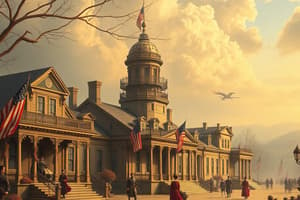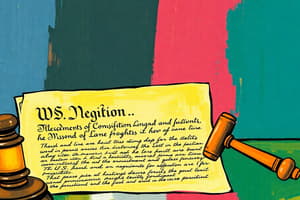Podcast
Questions and Answers
Which amendment protects the rights associated with bearing arms?
Which amendment protects the rights associated with bearing arms?
- Amendment 2 (correct)
- Amendment 1
- Amendment 10
- Amendment 5
What was a primary consequence of the Fugitive Slave Act?
What was a primary consequence of the Fugitive Slave Act?
- Strengthened the enforcement of slavery (correct)
- Led to the formation of the Republican Party
- Increased support for the abolitionist movement
- Promoted the idea of popular sovereignty
Which significant event is associated with John Brown's raid?
Which significant event is associated with John Brown's raid?
- Harpers Ferry (correct)
- Battle of Antietam
- Missouri Compromise
- Emancipation Proclamation
Which of the following best characterizes the Monroe Doctrine?
Which of the following best characterizes the Monroe Doctrine?
Which battle is recognized as a turning point in the Civil War?
Which battle is recognized as a turning point in the Civil War?
Which policy introduced by President Johnson faced significant opposition due to its leniency towards the South?
Which policy introduced by President Johnson faced significant opposition due to its leniency towards the South?
What was one of the objectives of the Temperance Movement?
What was one of the objectives of the Temperance Movement?
Which act was part of the attempt to address the presence of immigrants in relation to American jobs?
Which act was part of the attempt to address the presence of immigrants in relation to American jobs?
Flashcards
Gradualism
Gradualism
A policy of gradual emancipation (ending slavery) over time, rather than abolishing it immediately.
Nullification
Nullification
The belief that the federal government should not interfere with states' rights, including the right to nullify (cancel) federal laws.
Reconstruction
Reconstruction
A policy of the federal government to restore the Southern states to the Union after the Civil War, with goals of reuniting the nation, providing legal rights to freed slaves, and rebuilding the South infrastructure.
Wade Davis Bill
Wade Davis Bill
Signup and view all the flashcards
Manifest Destiny
Manifest Destiny
Signup and view all the flashcards
Compromise of 1850
Compromise of 1850
Signup and view all the flashcards
Monroe Doctrine
Monroe Doctrine
Signup and view all the flashcards
Roosevelt Corollary
Roosevelt Corollary
Signup and view all the flashcards
Study Notes
Amendments and US Government
- Amendments 1, 2, and 5 are mentioned
- US Constitution is discussed
- Connecticut Compromise is listed
- Virginia Plan is mentioned
- Separation of Powers is addressed
- Checks and Balances are highlighted
- Executive, Legislative, and Judicial branches are included
- Senate and House of Representatives are mentioned
- Monroe Doctrine is noted
- Missouri Compromise and War of 1812 are listed
- Louisiana Purchase, French and Indian War, Colonial Salutary Neglect, Abolition, Gradualism, Nullification, Secession are included
- Charles Sumner and the "Crime against Kansas", Compromise of 1850 are mentioned
Civil War Causes and Events
- Fugitive Slave Act is listed
- John Brown and Harpers Ferry are discussed
- Bleeding Kansas, Abolitionists, John Brown's death, South Carolina secession, and Second Great Awakening are included
- Nativism, Eli Whitney's cotton gin, Temperance Movement, Gang System are included
- European lack of support for the South in the Civil War is mentioned
- Emancipation Proclamation and Trent Affair are included
- Northern and Southern advantages during the Civil War are listed
- Battle of Antietam, Battle of Shiloh are mentioned
- Sherman's March to the Sea, Battle of Vicksburg, Lincoln's Reconstruction Plan, Wade-Davis Bill and Johnson's Reconstruction Plan are included
Reconstruction and Other Historical Events
- Congressional Reconstruction and its purpose are mentioned
- Wade-Davis bill restrictions and President Johnson are discussed
- Ulysses S. Grant, Military Reconstruction Act, Rutherford B. Hayes election and Fetterman Massacre are noted
- Frederick Jackson Turner's Manifest Destiny is covered
- Morrill Land Grant Act, Ghost Dance Movement and Buffalo Bill Cody are listed
- John O'Sullivan is noted
- Treaty of Guadalupe Hidalgo and Native Americans are included
- Mining in the West and Transcontinental Railroad are covered
- US Government expansion (including John O'Sullivan and Texas), Anti-imperialist League, imperialism, Manifest Destiny, are mentioned
- Matthew Perry, Queen Liliuokalani, Theodore Roosevelt, William Taft, Foraker Act, Monroe Doctrine, Platt Amendment, Roosevelt Corollary, Social Darwinism, Treaty of Kanagawa; Spanish American War, Treaty of Paris, Alfred Thayer Mayan, General Valeriano Weyler, Dupuy de Lome and the Spanish American War; Boxer Rebellion, Japanese trade relations with the US (1800s); Queen Liliuokalani, Jose Marti, USS Maine in Havana Harbor, William Taft and the Philippines, Teddy Roosevelt becomes President, Open Door Policy and John Hay, Senator Albert Beverage and the Philippines, Russia owning Alaska, William Seward's Icebox are listed
Studying That Suits You
Use AI to generate personalized quizzes and flashcards to suit your learning preferences.




